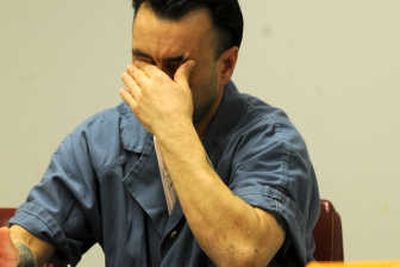Inmates attend fathering class

Brandon Neeser wanted to be as prepared as possible for the birth of his daughter once he was released from the Spokane County Jail.
So the young man – nicknamed Flame Thrower for his short temper – decided to take advantage of a new class offered in the jail: Engaging Fatherhood.
If his daughter cries, “I know what to do now,” said Neeser, who was released this month. Pointing to a pamphlet on Shaken Baby Syndrome, he said: “Don’t pick the baby up if you’re frustrated.”
The 23-year-old’s daughter is due this month. Her name: Nevaeh.
By attending the fatherhood class, Neeser and other inmates gain knowledge that authorities hope will help prevent tragedies like the one that recently caused the death of another girl named Nevaeh. Seven-month-old Nevaeh Alana Miller died March 22 in the care of her mother’s boyfriend, who is charged with murder. Police said a doctor determined the baby’s injuries were consistent with those of a baby who’s been shaken.
Neeser and seven other inmates attended the eight-week class, the first of its kind in a jail setting in Washington, officials said. Similar classes have been taught in penitentiaries, work release centers and state prisons, but because jail inmates typically have short stays, authorities have avoided engaging them in lengthy classes, said John O’Neill, a clinical social worker who developed the curriculum for Engaging Fatherhood.
O’Neill teaches the class with Matt Keller, a Washington Department of Corrections officer.
Neeser’s class graduated last month. For weeks, the men shuffled in and out of the jail’s library carrying manila envelopes decorated with pictures of their children, family and, in Neeser’s case, an ultrasound of his baby. Sheriff Ozzie Knezovich said he began working to add parenting classes at the jail last year, during the first Our Kids: Our Business campaign. The monthlong collaboration among social service agencies, law enforcement and media highlights issues surrounding child abuse and neglect.
A parenting class for mothers is in the works. Eight men started the second Engaging Fatherhood class that began Wednesday. “What we’re going to do is engage and embrace fatherhood,” Keller told the group. “We teach you the nuts and bolts of fatherhood.”
The instructors asked the men why they wanted to take part.
“My intentions are to get anything and everything out of this class to help myself,” said Dawayne Butler, who wants to be reunited with his 4-year-old daughter. For inmate David Johnson, the goal is to “be a better father than mine was.”
O’Neill said he wants the men to “be more excited about being dads. Often they have so many obstacles in their life that they don’t realize what they are doing impacts their children.”
O’Neill has been teaching fatherhood classes for 15 years as a family team coordinator with Partners with Families and Children, a program for abused or neglected children, and as a private contractor. Many participants in those sessions attend under court mandate, and Child Protective Services is involved in their families’ lives, he said.
The men in the Spokane County Jail apply to be in the class and undergo a screening, Keller said. Participants can’t have records of sex offenses or child abuse.
“Jail is a great time to intervene with men who are fathers,” O’Neill said. “We can use their captive time to get them pumped up about being a father and share with them what social services are available” when they get out, such as drug counseling or family services.
O’Neill’s course focuses on four aspects of parenting:
“Involvement – “the way the father spends time with the child.”
“Consistency “as individuals and for the child.”
“Awareness – being tuned in to what children need from fathers in terms of development.
“Nurturance – “the way in which we meet our children’s emotional needs.”
During the first sessions, O’Neill works to build men’s enthusiasm about fatherhood and emphasize the importance of their roles in their children’s lives. Toward the end of the class, O’Neill asks each man to write a mission statement – “a roadmap for their fathering behaviors and, on a deeper level, their commitment.”
He starts by asking participants what they want for their children, “and then we ask: What might get in the way? That’s when we bring up the barriers, such as drug abuse and absence.”
When O’Neill asked his first class what their children might be feeling because their fathers were away in jail, the men called out a verbal list: shame, lack of trust, confusion, anger, loss, hopelessness, fear, disappointment.
Julio Josef Davila, who has a 7-year-old daughter and 6-year-old son, stopped the men when he started to tear up.
The men in the fatherhood class seemed remorseful about what their children experienced as a result of their actions. “I’ve learned what I do, my children will imitate,” Davila said.